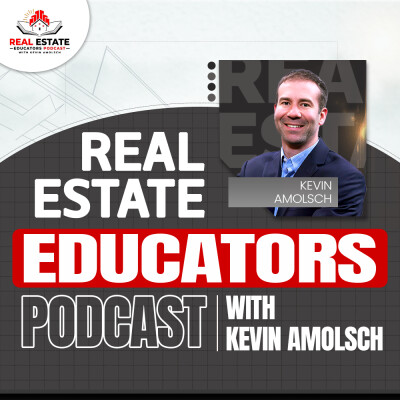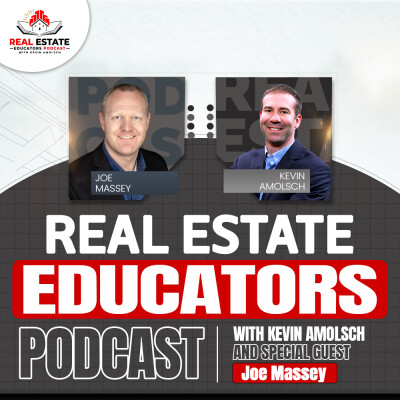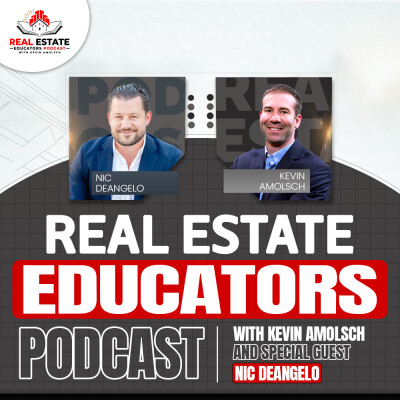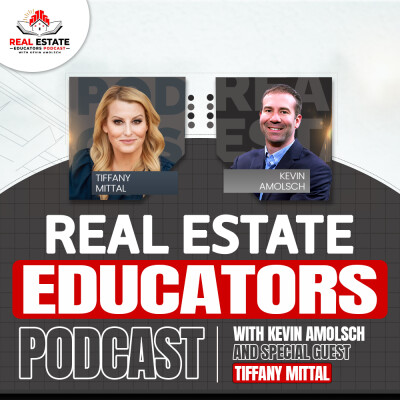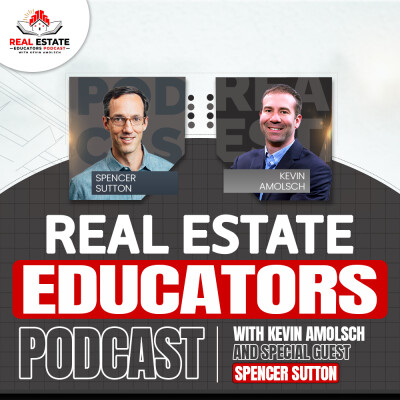- Speaker #0
We are in a pretty stable market and we've gone through some major chaos ever since COVID as we know. Short-term, two, three, four-year horizon in your underwriting is gone. We're starting to see a lot of markets shift to a buyer's market, meaning you can negotiate. You have more leverage to negotiate with the sellers, so you'll be able to get better deals.
- Speaker #1
We were in negotiations, we're investing in real estate. They're winning. They're making money.
- Speaker #0
What's up, everyone? Welcome to the Real Estate Educators Podcast, where we provide the education you can build on. I am your host, Kevin Amalsh. We are back. Look, I'm having a lot of fun with this podcast, both these solo episodes and when we get to meet some of these amazing experts that I'm interviewing week in and week out. If you're getting some value from this, help me out. Five-star review. Share this with a friend. That would really help me help more real estate investors like you, and that's ultimately the goal. So if you don't mind, help us out. Five-star review. So I'm out here on my balcony this chilly Monday morning. After a pretty great weekend, I got to hang out with some friends and some family. And oftentimes when we get together, this particular group, we talk about the market, the economy, real estate, interest rates, the White House and tariffs. All of these things that matter to me and to other real estate investors. And so I was thinking this weekend as we were talking about what's going on in the economy, I wanted to just shoot a quick podcast here and talk about what I'm seeing as far as the steadiness of the economy and how I'm reacting to that and what I'm suggesting to my clients and friends. So we know most of us don't want to hear this quite honestly, but... We are in a pretty stable market. Now, we've gone through some major chaos ever since COVID, as we know. So in 2020, when COVID hit and everyone was furloughed or laid off, unemployment spiked like we've never seen in history. So the government stepped in and they started pouring a bunch and bunch of money into the economy, unlike we've ever seen before. And all of this free money, what ends up happening is it causes inflation, as we know. We've talked about this many, many times. Part of inflation is rapid appreciation on housing. So if you owned rental properties during that time, you're probably pretty happy. So we saw double-digit appreciations in real estate for year after year. Unsustainable, obviously. And then we saw a little bit of a retraction. Some markets, like Denver, for example, gave some of that appreciation back. So we lost a little bit of value. And now what we're seeing is a pretty stable economy. interest rates because of the inflation back in 2022 when it hit its peak June of 2022 over nine percent inflation that was causing I mean that was really devastating to most families and so what the Fed decided to do to fight back is to go on a massive interest rate increase campaign and so we saw major spikes in interest rates on the short term which quickly followed by the long-term interest rates and we saw mortgage rates go over over 7% on the 30-year fixed. Well, they've backtracked a bit from that. So now we're floating in the low to mid 6% range as I'm recording this. And the expectation is that that's going to continue. So major economic economists like the head economist for MBA, for Wells Fargo, and Fannie Mae, those are the three bigs that are... that You see the charts and the graphing, the forecasts of the interest rate. All three of them are pretty much in line that we're going to be in the mid, low to mid sixes through 2027. Can you believe it? So 2027 is what a lot of the experts are expecting. I wouldn't be surprised either way, I guess. But I don't see a lot of factors that are going to drive interest rates on mortgages down. In fact, there's factors that will be driving them up. so if The government steps in and starts doing a quantitative easing campaign, which is expected. That will put downward pressure on 30-year fixed rate mortgages. But then you have other influences like tariffs and confidence in the 10-year treasury. A lot of the foreign governments now are starting to hold the reserves in gold instead of U.S. treasuries, which is... Hasn't happened like this for over 30 years. So as we see less buyers for the treasury, that will drive interest rates up to try to attract more buyers. So you're gonna have a little dueling pressures on mortgage rates over the next couple of years, I would expect. And I think that's probably why we're expecting to see some stability there. And then of course, we are seeing a lot of stability in housing. Very, very low, you know, 1% or less appreciation rates in most or many of the major markets. So what do we do with this? What do we do when we know that we have interest rate higher for longer interest rates, although we are seeing acceptance? People are moving and there is activity out there. But we have stable interest rates and we have stable home values. And then rents are... uh pretty stable as well some markets going down some going up a little bit depending of course on supply and demand so overall stability what do we do as real estate investors knowing that we have some stability and we can't just count on rapid appreciation like we've seen over the last five years or so well prior to um you know started coming down but we saw a good run on rapid appreciation even before coven we were seeing some pretty strong appreciation and i was actually Actually, it makes me think. Speaking with a friend not long ago about fixing and flipping and how investors have been so successful with fixing flips over the years and Even the investors that are slow and unmotivated and not doing a great job they were making even more money than maybe the professional flippers because professional flippers are in and out so quickly and Someone who's not really paying attention to the project and the project drags on they ended up making more money because the appreciation was higher and faster than their holding costs or their monthly burn rate. So you would see higher profits the longer a project took, which I guess is great, except for that's not sustainable, right? So now we have no, let's say no appreciation. So what is that going to do to the fix and flippers that are taking a while? That's part of the risk. And that's part of what I was talking with my friends and family over the weekend. So here's a couple of strategies, two, maybe three. strategies that I'm thinking about what I'm advising people that care my opinion, what I'm telling them they might want to consider. So number one is the short term two, three, four year horizon in your underwriting is gone. We're not seeing a lot of profit because we're not getting the appreciation. So what's ended up happening is the cost to buy a property, the cost to rent it out and maintain it, and then the cost to sell it is more is eroding the returns to a point where it doesn't make sense to buy properties if you're going to only hold it for three or four years. I'm not seeing a lot of profit there. So even if you're going to, this is the same advice, even if you're going to buy a first-time home or you're going to buy a home for your own family, if you're not planning to live there for over three years, four years, I think maybe renting would be a better option for you just because of the cost to maintain and the cost to buy and sell and those. So the advice is rental properties are still going to work. If you own rental property, you will become wealthy over time. But the key there is it's over time. So I would suggest people start underwriting their deals with a horizon of seven years or more, 10 years better. I like to look at my deals like I'm never going to sell them. So I don't really care about the appreciation. So I'm just planning to hold on to it forever. And then at some point, maybe I sell it, but that's not in the plan. So the plan is to hold forever. I think that's a better strategy right now. In case rents soften a little bit, in case real estate values soften a little bit, in case they just don't go up at all over the next couple of years, over time, you will become wealthy because your rents will go up eventually. The values will go up eventually. Interest rates will come down eventually. And you also gotta remember that your tenant is paying off your mortgage for you. So every month, a little bit of principle. now it gets reduced off that loan balance so long term rental properties is an excellent strategy in a stable market like this and we're starting to see a lot of markets shift to a buyer's market meaning you can negotiate you have more leverage to negotiate with the sellers so you'll be able to get better deals and underwrite for cash flow right i talk about this all the time don't underwrite for appreciation appreciation is a bonus It's a fantastic bonus and you will get it over time. But we like to underwrite our deals for the cash flow. And that way we can hold on to the property however long it takes until we get to a good selling market.
- Speaker #1
This episode is brought to you by Pine Financial Group. Pine Financial is a private lender specializing in short-term rehab lending to real estate investors.
- Speaker #0
Got a property that needs some love? We can help. We are able to offer funding solutions because we raise private money from individual investors. With more than 15 years of experience, Pine offers passive investors an alternative that provides stability, consistency, and security to your portfolio. If you like real estate but want to avoid the ups and downs in effort, a Pine Mortgage Fund could be a perfect fit for you. Accredited investors will experience an 8% preferred return and profit sharing.
- Speaker #1
Diversify your portfolio out of Wall Street and into Main Street with a Pine Financial Group Mortgage Fund. Get more information at pinefinancialgroup.com. That's pinefinancialgroup.com.
- Speaker #0
All right, number two, a strategy that I'm seeing and I think is effective is still the fix and flips, guys. Fix and flips work in every market. The beautiful thing about a fix and flip holding a property five, six, maybe seven months is that you're buying in a market and you're selling in a very similar or the same market. You don't see a ton of movement in real estate over a short period of time. Real estate values go up and they go down, but it's slow. It's not like the stock market where you can see massive swings in a single day. Real estate goes up and down slowly. So over a six month period, you're not going to have too much exposure to market fluctuation. So what does this mean with the short-term flips? We're not seeing big heavy rehabs right now. Not a lot of additions, you know, popping out the side or going to the backyard or popping the top and putting on another story on the house. There was a time where that was very effective. We're just not seeing a lot of that right now. We're seeing clients want to get in and out of a rehab in four to six weeks. So think about your kitchen bath remodels. One downside to this is it is harder to find these deals because of the lack of inventory. So I'm not going to sugarcoat this. When you have short inventory or small inventory like we do right now, your typical home buyer, your consumer, your end user is going to buy properties that need a little bit of love, a little bit of fix and flip, a little bit of fixing, a handyman special or whatever. So your kitchen bath remodels are a little bit tougher to find. but those are going to be the most successful in my opinion in this market just because you're limiting your exposure to the market you're in and out quickly you're not counting on any appreciation you're not going to get it anyways you're keeping your holding cost to an absolute minimum so that should drive up profits now i'm not saying that your heavy remodel won't work everything will work at a certain price so if you see some major remodel foundation issues, something like that. There's still opportunity there, no doubt about it. You just need to get a great price because you're not going to have any appreciation in your five or six months that you're holding the property. And then finally, I know I talked about this a lot, but the passive investing on the debt side is still very effective. So if you're not interested in the appreciation, you know it's not going to happen over the next couple of years, you're not counting on that, and you just want a solid return with some cash flow, you know, nine, 10%, something like that. investing in real estate debt or a real estate debt fund is still a great option. Obviously, we manage real estate debt funds, which is part of the reason I'm saying this, but I'm not just saying it to self-serve. I really believe that it's a fantastic investment in this environment, which is why I'm investing so much of my capital into real estate debt instead of actual real estate right now. So that would be a third little bonus option. invest in real estate debt. That's just making a loan to somebody that's doing a fix and flip or something. So if you need any help with that, let me know. Happy to help you. What are some of the risks in a flat market like we're experiencing right now? Well, we talked a little bit about this. You can't count on the appreciation. So your holding costs is one of the highest risks, I would say, whether it's a rental or a fix and flip. If that thing goes vacant, you're going to have monthly payments. You're going to have utilities. You're going to have some construction. and so we want to limit that as much as possible and we're not going to be counting on rental increases right now either so you want cash flow we talk about it a lot you definitely want cash flow but you also want to keep your properties full so i would say keeping your rents at a competitive rate maybe even a little bit under market value to keep those rental properties full and keep the turnovers to a minimum are going to be pretty big um to keep your holding costs down and then your fix and flips like we talked about keep your rehab budgets low interest rate risk is there it's still um relevant you know you hear a lot of people say well i'm going to date the rate and i'm going to date the yeah date the rate and marry the house or whatever and all they're saying there is you're going to buy a property forever you're going to own it forever and you're going to keep your interest rate for a little while and then you'll switch out the interest rate once the interest rate goes down well it's a good idea and it is effective and it is very true. I'm just cautioning you, as I've mentioned earlier, that you're not going to get that lower interest rate anytime soon. So if you could hold onto a property and it's still cash flowing, and you can do that for a couple of years, eventually rates will go down. And eventually you could refinance your mortgage and get into a nice low fixed rate loan and increase your income or increase your cashflow. But I wouldn't be counting on that in next couple of years. Just underwrite it knowing that your interest rate is going to be what it is and just keep it. Keep to the fundamentals. Fundamentals matter in a stable market like we're in right now. So that would be my piece of advice on the interest rates. We're not seeing a lot of growth in interest rates because of the deportations and lack of, you know, the birth rates weighed down. It's been down for many years. So we're not seeing a lot of increase in populations in a lot of the markets for those couple of reasons. So it's not driving up rents. So just underwrite it without... you know massive rent increases i see sometimes people will put in their five six percent rent increases in their underwriting and i just don't think that that's sustainable so i would underwrite these for you know a seven year term and maybe really conservative rent increase over time you know one or two percent i know that sounds super conservative but i think that's where my head's at right now and i wouldn't think that you're going to get a lot of rent increases in the first couple of years over time it will but the first couple of years probably not So those are a couple of the risks. I'd be very curious to hear what you think. If you're seeing this on YouTube, first hit subscribe. That would be great. But leave me some comments below. What are you thinking are some good strategies in a stable market? Do you agree with me that we're in a stable market? I know people want to say, you know, the jobs market's a little crazy and we've had negative job growth for at least one month after the revisions. We've seen massive revision in the jobs numbers. So there's some concern there. Even with that concern, I don't think that there's a lot of noise because we're still at a good unemployment number, at least at the time I'm recording this. We're at 4.3. That's still pretty solid. And inflation seems to be under control. Stagflation is not really a concern for most economists. At least that's not what I'm reading. So overall, I think it's pretty good. although A lot of people want to complain. A lot of people want to tell me that there's a tough road ahead and there's a tough market and there's foreclosures and doom and gloom, right? So I hear this all the time and I'm just not going to agree with that, but I'd love to know what you think. If you disagree with me and you think that there's chaos in the market right now and we want to talk about that and how we could benefit from that, if that is true, I'd love to hear what you have to say. So leave some comments below. Otherwise, if you got some value from this, please five-star review, share with a friend. Um, and look, you have other podcasts you could be listening to, and you chose to tune in here to the real estate educators podcast. I'm so incredibly grateful for you. So thank you for that. And I hope you make this day a great one.
- Speaker #1
Hey guys, I hope you enjoyed this episode as much as I did. If you did, please be sure to follow and leave us a review.
- Speaker #0
Oh yeah. And tell a friend.

